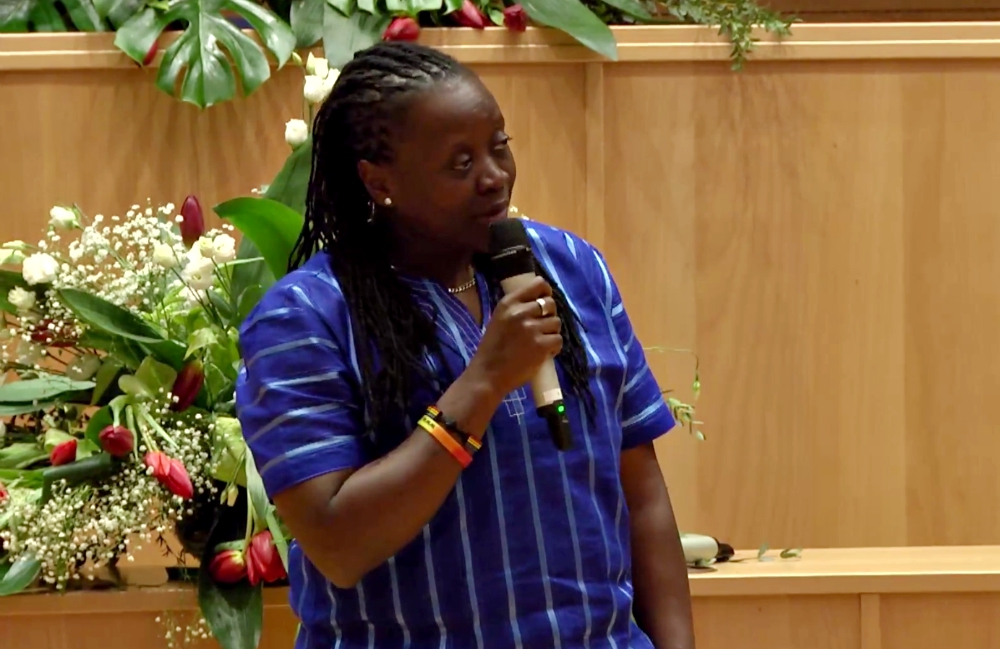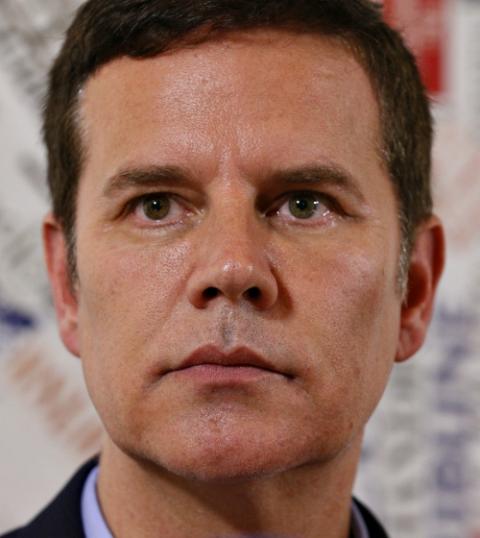
Ssenfuka Joanita Warry speaks at the Voices of Faith event March 8 in Rome. (YouTube/Voices of Faith)
Last week, LGBTQ Catholics and their allies who are looking to Pope Francis for signs of hope for inclusion within their church were faced with another holy conundrum.
Juan Carlos Cruz, a Chilean survivor of sexual abuse, told the Spanish newspaper El País in an interview May 21 that, after coming out to Francis during a recent meeting, the pope told him: "Juan Carlos, it doesn't matter that you're gay. God made you that way and that is the way he wants you to be, and I don't mind. The pope wants you this way too, and you have to be happy with who you are."
The pope's alleged comments were tempered by two factors. First, the Vatican would not confirm that these were Francis' words, insisting that they do not comment on the pope's private conversations.
Second, just four months earlier, Francis had publicly accused Cruz of making slanderous statements against Chilean Bishop Juan Barros, whom Cruz claims watched as a fellow priest, Fr. Fernando Karadima, sexually assaulted him in the 1980s. Cruz also accused Barros of hindering a later investigation into Karadima.
Barros has denied that he witnessed the abuse. Karadima was sentenced in 2011 by the Vatican to a life of prayer and penance and maintains his innocence.
Francis appointed Barros a bishop in 2015, and defended him stridently when questioned by reporters before an open-air Mass on Jan. 18 in the Chilean city of Iquique.
"The day they bring me proof against Bishop Barros, I will speak," Francis said.
"There is not one piece of evidence against him," the pope insisted. "It is calumny. Is that clear?"

Juan Carlos Cruz (CNS/Paul Haring)
The incident was the first major black eye on a papacy that has managed to maintain a remarkably unmarred image for the past five years. It thrust Francis into the new terrain of damage control. His meeting with Cruz was one of several rehabilitative gestures.
In his interview with El País, Cruz says that he came out to the pope because, as part of their character assassination of him, the Chilean bishops used his sexuality as proof that he was "perverse," "unhinged," "an enemy of the church" and one who "did not have the faith."
Francis' words of acceptance toward Cruz were part of his apology for believing the bishops' slanderous words about the abuse survivor. A few weeks after meeting with Cruz, Francis called all 34 Chilean bishops to Rome for a two-day meeting. The bishops later offered their resignations. Francis has yet to say whether he will accept them.
So, have we reached a new milestone in the transformation of the pope's understanding of gays and lesbians?
Well, not quite. Just three days after Cruz's interview was published, various reports from Italian media, including the Vatican Insider, emerged claiming that Francis had told the Italian bishops' conference, in a closed-door meeting, that men with "deeply rooted" homosexual tendencies, or who "practice homosexual acts," shouldn't be allowed into the seminary.
Francis' comments seem to be a reaffirmation of the 2016 document that he approved called "The Gift of the Priestly Vocation," which bans gay men from seminaries and ordination.
The document from the Congregation for the Clergy quotes a 2005 instruction from the Congregation for Catholic Education, which stated: "The Church, while profoundly respecting the persons in question, cannot admit to the seminary or to holy orders those who practice homosexuality, present deep-seated homosexual tendencies or support the so-called 'gay culture.' "
The Vatican will no more confirm Francis' homophobic words to the Italian bishops than they will verify Cruz's story. So, once again, LGBTQ Catholics find themselves dancing an emotional cha-cha with Francis, who seems to want to lead us in repetitive steps forward and backward.
Francis, who has spoken prophetically in defense of the Earth and the poor, and against capitalism and consumerism, cannot seem to summon the boldness needed to speak clearly and openly about what exactly he believes to be true about LGBTQ people.
Advertisement
Other than his still-ambiguous "Who am I to judge?" comment in 2013, the only truly affirming remarks Francis has offered to LGBTQ persons have come from secondhand accounts from the few openly gay men who were given the privilege to speak to him. Can we possibly find authentic hope in Francis' strange game of telephone?
Rather than try to decode Francis' language or struggle to discern what is truly in his heart, perhaps it is time to admit how inadequate his rumored words are in the face of the grave spiritual harm, loss of work and civil rights, and physical violence endured by LGBTQ persons everyday, often at the hands of Christian churches and teachings.
Few people understand better the grim threats faced by LGBTQ persons than Ssenfuka Joanita Warry, a lesbian activist from Uganda, a country where same-sex relations are punishable by life in prison.
In October 2010, she was one of 100 Ugandans who had their names, addresses and photos published in a local newspaper called Rolling Stone, with a banner urging, "Hang Them." A photo of her friend and fellow activist David Kato was on the cover. Three months later, he was beaten to death with a hammer.
Warry has watched as young lesbian women are forced into marriages by their families in order to save face in their communities, or, worse, are subjected to "corrective rape," in an attempt to coerce them back into the heterosexual fold.
In a brief and moving speech at this year's Voices of Faith event held in Rome, Warry explained why the Catholic doctrine on same-sex love emboldens the persecution of LGBTQ persons.
"Any message that comes from the church is treated as a message that comes from God," she explained.
"There are 193,000 Christian churches in Uganda. All of these religious leaders supported the anti-homosexuality bill," referring to Uganda's 2014 extreme legislation that criminalized same-sex relations.
Warry said that "what hurts most is that world religious leaders" refuse to oppose discrimination against lesbian, gay, bisexual, transgender and intersex persons. "Not doing anything makes them complicit."
Francis urgently needs to hear Warry's voice, especially since, during his trip to Kenya, Uganda and the Central African Republic in November 2015, he refused to speak out against draconian anti-gay laws, despite repeated petitions from African activists.
Sadly, Warry did have the chance to speak on Vatican grounds in March. But that opportunity was rejected by Cardinal Kevin Farrell, prefect of the Vatican's Dicastery for Laity, Family and Life, who denied "Voices of Faith" from holding its fourth annual Women's Day event inside the Vatican, as it had done the previous three years. Warry's status as an openly lesbian activist was one of the reasons Farrell shunned the group.
According to a CNS report, Farrell explained that events held within the Vatican are "presumed to be sponsored by the pope" and people assume that "the pope is in agreement with everything that is said."
Farrell's statement leaves us to assume that Francis would not have agreed with Warry's words and her work.
That's a tragedy, because the conclusion of Warry's speech in Rome might have helped Francis understand depth of courage and the quality of hope that is so desperately needed from the church's hierarchy.
"Our religious leaders hold the key to protection of LGBTI persons, not only in Africa," Warry said. "Imagine if the Vatican stands against criminalization of LGBTI persons and decides to stand and defend life? Then we have hope."
In many parts of our world, LGBTQ persons are as marginalized as some of the poorest of the poor, facing poverty, lack of work and sexualized violence because of their status. For those in parts of the world where there is no threat of imprisonment or death, there is the spiritual violence of being rejected by family, the workplace and the church.
In the face of so much suffering, LGBTQ persons deserve much more than hearsay. They deserve the same level of outspoken, vigorous advocacy that the pope offers other oppressed groups.
Francis told Cruz that it "doesn't matter" if he is gay. But the need for Francis to speak boldly and clearly in defense of LGBTQ people does matter. In fact, for many of us, it's a matter of life and death.
[Jamie L. Manson is NCR books editor. She received her Master of Divinity degree from Yale Divinity School, where she studied Catholic theology and sexual ethics. Her email address is jmanson@ncronline.org.]








